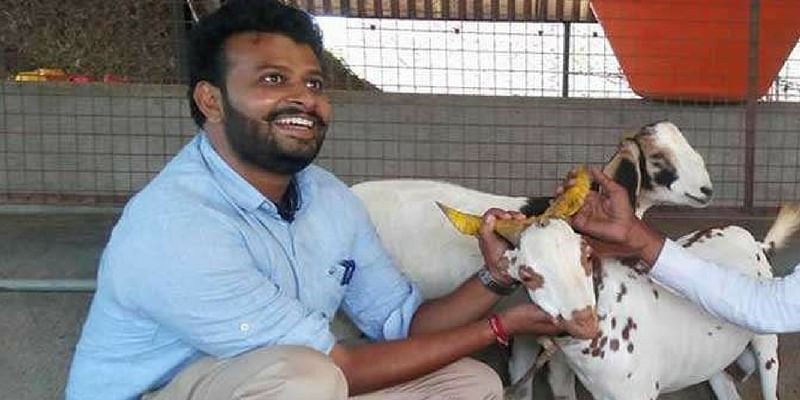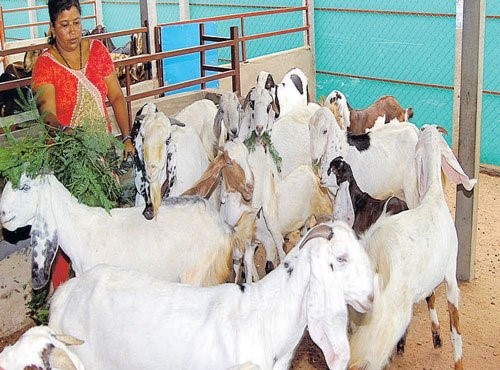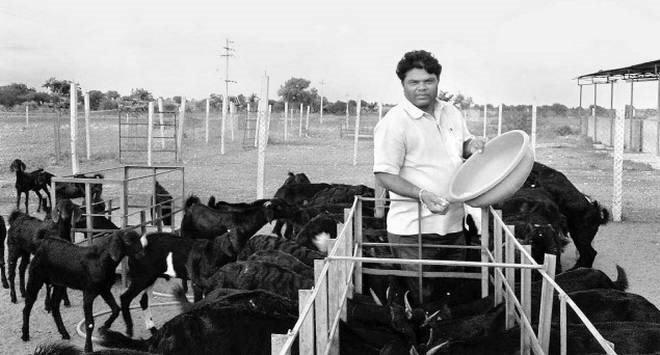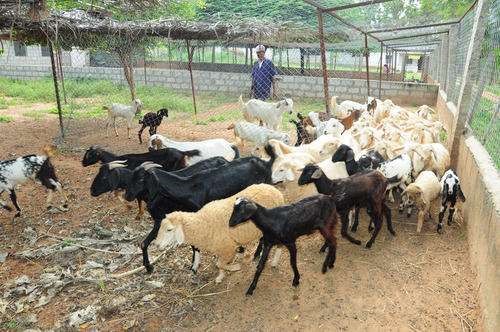MISCELLANOUS
Back
Sandeep Singh and Rajpreet Singh
Sandeep Singh and Rajpreet Singh, residents of Taruana, a village in Sirsa district, Haryana, wanted to do business instead of doing job after graduation. Rajpreet has completed his M.Sc. in Agriculture, so on his suggestion, the two friends decided to pursue agriculture or livestock farming business. For this purpose, they first thought of setting up a polyhouse but due to some reason, they did not succeed.
 After that, they decided to start livestock business. For this, they met with the veterinarians and they advised them to adopt Goat Farming.
With the advice of experts, they got training for the Goat Farming before starting. They went to CIR Mathura for training and after 15 days of training, they started SR COMMERCIAL Goat Farm at 2 kanal land in Taruana village.
Now-a-days, it is very common that if you want to start a business, it can be easy to get a loan from the bank but Sandeep and Rajpreet started the Goat Farm in 2017 with the help of their family members without any financial assistance.
As the saying goes, the paths are met with one’s advice, but to achieve the destination, one has to work hard.
So, both of them started working hard to achieve success in this business. They wisely started the Goat Farm with only 10 goats on a small scale, all of which were of the beetle breed. They brought these goats from the mandis of Ludhiana, Raikot, Moga, of Punjab State. Gradually, they became aware of the problems that arise in Goat Farming. Then they started looking for solutions to these problems.
Their steadfast determination and support from family members led them make the Goat Farming profitable. Sandeep and Rajpreet then started working on improving the goat breeds in the farm. Today, due to their hard work, the number of goats in their farm has increased from 10 to 150 within 2 years.
Abhishek
After that, they decided to start livestock business. For this, they met with the veterinarians and they advised them to adopt Goat Farming.
With the advice of experts, they got training for the Goat Farming before starting. They went to CIR Mathura for training and after 15 days of training, they started SR COMMERCIAL Goat Farm at 2 kanal land in Taruana village.
Now-a-days, it is very common that if you want to start a business, it can be easy to get a loan from the bank but Sandeep and Rajpreet started the Goat Farm in 2017 with the help of their family members without any financial assistance.
As the saying goes, the paths are met with one’s advice, but to achieve the destination, one has to work hard.
So, both of them started working hard to achieve success in this business. They wisely started the Goat Farm with only 10 goats on a small scale, all of which were of the beetle breed. They brought these goats from the mandis of Ludhiana, Raikot, Moga, of Punjab State. Gradually, they became aware of the problems that arise in Goat Farming. Then they started looking for solutions to these problems.
Their steadfast determination and support from family members led them make the Goat Farming profitable. Sandeep and Rajpreet then started working on improving the goat breeds in the farm. Today, due to their hard work, the number of goats in their farm has increased from 10 to 150 within 2 years.
Abhishek
 Most youngsters wish to land a job in the United States of America, and many professionals work hard for the same. However, one young scientist from Maharashtra quit his job in the US and started rearing goats in his village. A native of Buldhana district, Abhishek Bharad now earns in lakhs.
His father Bhagwat Bharad, a former engineer in the irrigation department, wished for his son to receive a good education and get a high-paying job. Abhishek fulfilled this dream and even landed a job in the US.
Abhishek completed his BSc from Panjabrao Deshmukh Krishi Vidyapeeth in 2008. He then went to the US to pursue his master's in science and a doctorate from Louisiana State University. After completing his doctorate in 2013, he earned a job as a scientist at the university. He worked there for two years but did not feel satisfied.
He took a 20-acre land on lease and then decided to take a goat shelter on rent. Initially, he kept around 120 goats in the shelter. However, he had twice the number of goats in one year, and it has now increased to 350.
Abhishek takes pains to ensure the welfare of his goats and personally ensures that their shelter is kept clean. He has also grown maize and millet on six acres of land for his goats to feed on. Abhishek presently makes a profit of Rs 10 lakh from his goat farming business. With the number of goats increasing in future, the profit will also increase.
Veena Shivabalu Nirwani, a farmer in Chikkodi taluk of Belagavi district, has taken up goat rearing as a supplementary activity to farming.
Most youngsters wish to land a job in the United States of America, and many professionals work hard for the same. However, one young scientist from Maharashtra quit his job in the US and started rearing goats in his village. A native of Buldhana district, Abhishek Bharad now earns in lakhs.
His father Bhagwat Bharad, a former engineer in the irrigation department, wished for his son to receive a good education and get a high-paying job. Abhishek fulfilled this dream and even landed a job in the US.
Abhishek completed his BSc from Panjabrao Deshmukh Krishi Vidyapeeth in 2008. He then went to the US to pursue his master's in science and a doctorate from Louisiana State University. After completing his doctorate in 2013, he earned a job as a scientist at the university. He worked there for two years but did not feel satisfied.
He took a 20-acre land on lease and then decided to take a goat shelter on rent. Initially, he kept around 120 goats in the shelter. However, he had twice the number of goats in one year, and it has now increased to 350.
Abhishek takes pains to ensure the welfare of his goats and personally ensures that their shelter is kept clean. He has also grown maize and millet on six acres of land for his goats to feed on. Abhishek presently makes a profit of Rs 10 lakh from his goat farming business. With the number of goats increasing in future, the profit will also increase.
Veena Shivabalu Nirwani, a farmer in Chikkodi taluk of Belagavi district, has taken up goat rearing as a supplementary activity to farming.
 Eventually, she was drawn to goat farming and decided to take it up full time. In 2013, with an investment of Rs 50,000, Veena bought goats of Jamunapari breed. Over the years, the size of herd increased and so did the income. So far, she has invested about Rs eight lakh in goat rearing and the earnings have been satisfactory. Recently, she has constructed a hi-tech goat shed with better facilities to ensure proper hygiene and healthy growth of the herd. Goat droppings and urine are collected separately and used as manure for the crops.
She has taken up goat rearing as a commercial enterprise and raises improved breeds that weigh more and give high meat yield. Each breed has its unique advantages. The breeds that are raised for meat have good demand in local and outside markets. Veena observes the trends in the market, which helps her balance the demand and supply ratio. A two-year-old Jamunapari goat is sold at around Rs 15,000. Boer is the most expensive goat breed and a three-month-old kid is sold at Rs 25,000. Raising a pure Boer breed is difficult as it doesn’t get adjusted to all climates easily. Hence, farmers normally cross-breed it with Osmanabadi goats.
Imamsab Nadaf
Imamsab Nadaf (40), a native of Sindagi taluk, has successfully taken to goat farming at Antargangi village. A diploma-holder in computer science, he worked in the Gulf for some years, before returning to India in 2009. “At first, I was not sure what business to do. Then, a friend advised me to start farming as we had agricultural land,” he said.
Eventually, she was drawn to goat farming and decided to take it up full time. In 2013, with an investment of Rs 50,000, Veena bought goats of Jamunapari breed. Over the years, the size of herd increased and so did the income. So far, she has invested about Rs eight lakh in goat rearing and the earnings have been satisfactory. Recently, she has constructed a hi-tech goat shed with better facilities to ensure proper hygiene and healthy growth of the herd. Goat droppings and urine are collected separately and used as manure for the crops.
She has taken up goat rearing as a commercial enterprise and raises improved breeds that weigh more and give high meat yield. Each breed has its unique advantages. The breeds that are raised for meat have good demand in local and outside markets. Veena observes the trends in the market, which helps her balance the demand and supply ratio. A two-year-old Jamunapari goat is sold at around Rs 15,000. Boer is the most expensive goat breed and a three-month-old kid is sold at Rs 25,000. Raising a pure Boer breed is difficult as it doesn’t get adjusted to all climates easily. Hence, farmers normally cross-breed it with Osmanabadi goats.
Imamsab Nadaf
Imamsab Nadaf (40), a native of Sindagi taluk, has successfully taken to goat farming at Antargangi village. A diploma-holder in computer science, he worked in the Gulf for some years, before returning to India in 2009. “At first, I was not sure what business to do. Then, a friend advised me to start farming as we had agricultural land,” he said.
 Initially, he took to lemon and pomegranate cultivation. “After three years, I switched over to goat farming in 2012 by spending Rs. 2.1 lakh to purchase 62 lambs,” he said. Two years later, he earned a profit of Rs. 6.5 lakh from selling goats. Today, he has nearly 500 goats worth Rs. 7 lakh. Mr. Nadaf believes that goat farming is a good source of income.
Srinivas A farmer from Nanjungodu of Karnataka is been a Iconic farmer. He had into field from past 3 years Goats are multi-functional animals. You can produce a wide variety of products from goats, such as milk, meat, fiber, manure etc. Goat's milk is used for producing full cream goat powder, skimmed goat milk powder, goat butter, goat milk cream, fresh goat milk etc.
Initially, he took to lemon and pomegranate cultivation. “After three years, I switched over to goat farming in 2012 by spending Rs. 2.1 lakh to purchase 62 lambs,” he said. Two years later, he earned a profit of Rs. 6.5 lakh from selling goats. Today, he has nearly 500 goats worth Rs. 7 lakh. Mr. Nadaf believes that goat farming is a good source of income.
Srinivas A farmer from Nanjungodu of Karnataka is been a Iconic farmer. He had into field from past 3 years Goats are multi-functional animals. You can produce a wide variety of products from goats, such as milk, meat, fiber, manure etc. Goat's milk is used for producing full cream goat powder, skimmed goat milk powder, goat butter, goat milk cream, fresh goat milk etc.
 Goat farming is not a new enterprise. Rearing goats is a profitable business. Goat has been rearing since the time immemorial. Generally, goat farming means rearing goats for the purpose of harvesting milk, meat and fiber.
Mr.Vivaik
Mr.Vivaik S/o Shri Charan Singh, B.A, Resident of Agra (UP) who was doing parental business of Truck Transport showed keen interest in commercial goat farming. As per advice from Central Institute for Research on Goats (CIRG) Institute he obtained 10 days National Training Programme on Scientific Goat Farming in September, 2014 which is currently being conducted 6 times per year by Central Institute for Research on Goats. He initiated his goat farm with the objective to supply pure breed and pedigreed good quality from Barbari goats based on recorded performance to newly coming up commercial goat farmers and entrepreneurs.
He made a model goat farm in 3 acres of land on scientific line by spending about 29 lacks on construction of shades (different shades according to age, sex, and production stages), bhoosa store, grain storage, dipping tank, manure tank, area for fodder cultivation etc. Later on he expanded his farm by keeping goats of other breeds.
Currently he has 422 goats of different breeds :
Barbari - 202
Jamunapari - 62
Jakhrana - 39
Sirohi - 49
Goat farming is not a new enterprise. Rearing goats is a profitable business. Goat has been rearing since the time immemorial. Generally, goat farming means rearing goats for the purpose of harvesting milk, meat and fiber.
Mr.Vivaik
Mr.Vivaik S/o Shri Charan Singh, B.A, Resident of Agra (UP) who was doing parental business of Truck Transport showed keen interest in commercial goat farming. As per advice from Central Institute for Research on Goats (CIRG) Institute he obtained 10 days National Training Programme on Scientific Goat Farming in September, 2014 which is currently being conducted 6 times per year by Central Institute for Research on Goats. He initiated his goat farm with the objective to supply pure breed and pedigreed good quality from Barbari goats based on recorded performance to newly coming up commercial goat farmers and entrepreneurs.
He made a model goat farm in 3 acres of land on scientific line by spending about 29 lacks on construction of shades (different shades according to age, sex, and production stages), bhoosa store, grain storage, dipping tank, manure tank, area for fodder cultivation etc. Later on he expanded his farm by keeping goats of other breeds.
Currently he has 422 goats of different breeds :
Barbari - 202
Jamunapari - 62
Jakhrana - 39
Sirohi - 49
